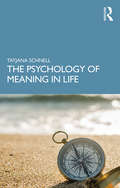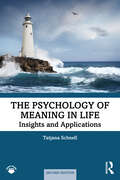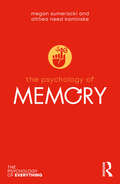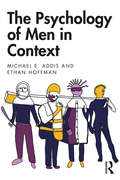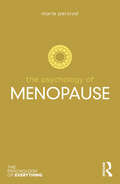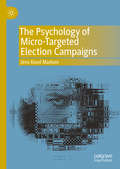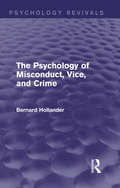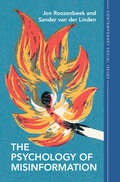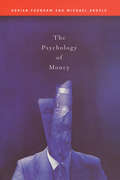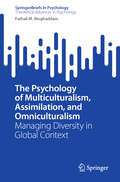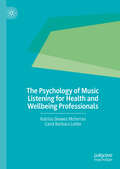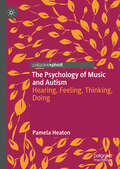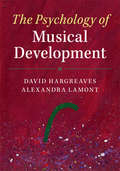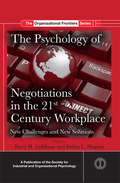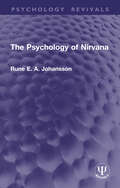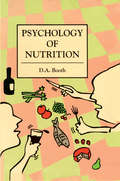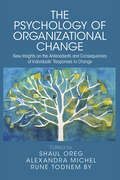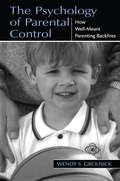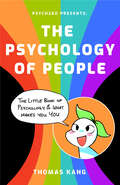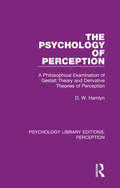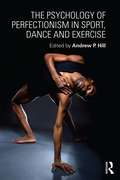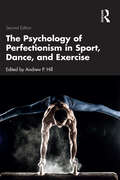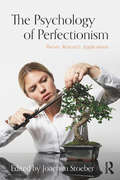- Table View
- List View
The Psychology of Meaning in Life
by Tatjana SchnellThis book offers an inspiring exploration of current findings from the psychology of meaning in life, analysing cutting-edge research to propose practical, evidence-based applications. Schnell draws on psychological, philosophical and cognitive perspectives to explore basic concepts of meaning and introduce a multidimensional model of meaning in life. Written in an accessible style, this book covers a range of topics including the distinction between meaning and happiness, the impact of meaning on health and longevity, meaning in the workplace, and meaning-centred interventions. Each chapter ends with exercises to encourage self-reflection and measurement tools are presented throughout, including the author’s original Sources of Meaning and Meaning in Life Questionnaire (SoMe), to inspire the reader to consider the role of meaning in their own life. The Psychology of Meaning in Life is essential reading for students and practitioners of psychology, sociology, counselling, coaching and related disciplines, and for general readers interested in exploring the role of meaning in life.
The Psychology of Meaning in Life: Insights and Applications, Second Edition
by Tatjana SchnellThe new edition of this bestselling book, The Psychology of Meaning in Life, has been thoroughly updated to offer an inspiring exploration of cutting-edge findings from the psychology of meaning in life. Schnell draws on multiple psychological and philosophical perspectives, including those from existential, clinical, social, positive, and health psychology, and lived experience to introduce a multidimensional model of meaning in life.Written in an accessible style and full of practical, evidence-based applications, this book covers a range of topics, including the distinction between meaning and happiness, the impact of meaning on health and longevity, the connection between worldview and meaning, meaning in the workplace, meaning-centred interventions, and existential communication. The Hierarchic Meaning Model explains how meaning emerges, from basic perception to the complex experience of meaning in life. By situating meaningfulness – experienced as significance, purpose, coherence, and belonging – within broader social contexts, the book discusses the effects of inequality and global crises and suggests introducing an ethics of meaning. Measurement tools are presented, and each chapter ends with exercises to encourage self-reflection, inspiring the reader to consider the role of meaning in their own life.The Psychology of Meaning in Life, Second Edition has crucial significance for advancing the field of existential health. It is essential reading for students, researchers, and practitioners of psychology, sociology, counselling, pastoral care, coaching, healthcare, and related disciplines, and for general readers interested in exploring what makes life meaningful.
The Psychology of Memory (The Psychology of Everything)
by Megan Sumeracki Althea Need KaminskeHow can I improve my memory? Do my emotions affect my memories? How will my memory change as I get older?The Psychology of Memory provides a unique insight into a fundamental part of being human, debunking many common misconceptions about what memory is, how memory works, and the accuracy of our memories. It explores the complexity of human memory, looking at how we remember different types of information and the impact of issues like ageing and emotion on how we create, store, and retrieve memories. Extremes of memory from so-called photographic memory to dementia are discussed, along with ways our memory can impact our everyday lives in educational and legal settings.Treating memory as malleable, dynamic, and active, The Psychology of Memory teaches us about how our individual memories function, and how we can harness this to see memory in a new way; to use the past, our experiences and information, in service of the present and future.
The Psychology of Men in Context
by Michael E. Addis Ethan HoffmanWhat does it really mean to say that boys will be boys, men are from Mars, or that contemporary men are in crisis? Does modern psychology support or refute these notions? And how is psychological theory and research about boys and men used in society? The Psychology of Men in Context is an essential introduction to the field which challenges readers to examine psychological research on men, masculinity, and gender, and consider its impact on daily life, through everyday speech, popular media, political rhetoric, and more. The authors offer a range of lenses for studying masculinity, including biology, social learning, social constructionism, feminism, and intersectionality. Demonstrating how these frameworks can be used to understand research on pressing topics such as violence, health, and relationships, the book also considers masculinity in its broader philosophical and historical contexts, equipping readers with the tools needed to connect the psychology of men with other areas of social science. Exercises and prompts to help students relate the research to their own lives are included throughout. Designed for students at undergraduate and graduate level, but suitable for anyone curious about understanding the field from a more critical social scientific perspective, The Psychology of Men in Context is a valuable introduction to the history, current scholarship, and social implications of the psychological study of men and masculinity.
The Psychology of Menopause (The Psychology of Everything)
by Marie PercivalWhat physical and psychological changes can I expect when going through the menopause? How can I protect my well-being during menopause? How can I ensure a good menopause experience?The Psychology of Menopause provides a useful and positive guide to understanding the psychological, social, and sexual changes that occur during and following menopause. Going beyond hot flushes and HRT, it focuses on how to enhance psychological well-being by looking at the science behind women's lived experiences of perimenopause and postmenopause. The book explores key psychological issues during this transition, such as the risk factors associated with mood and anxiety, the changing social and personal roles for women in midlife, the impact on relationships, and the reasons for brain fog.By putting women’s psychological well-being at the heart of this stage of life, The Psychology of Menopause provides a much-needed examination into the psychological, social, cultural, and interpersonal aspects of the transition into and beyond menopause.
The Psychology of Micro-Targeted Election Campaigns
by Jens Koed MadsenThis book examines the psychology behind micro-targeted tactics used in election campaigning and the advent of increasingly sophisticated dynamic Agent-Based Models (ABMs). It discusses individual profiling, how data and modelling are deployed to enhance the effectiveness of persuasion and mobilization efforts in campaigns, and the potential limitations of these approaches. Madsen particularly explores how psychological insight and personal data are used to generate individualised models of voters and how these in turn are applied to optimise persuasion strategies tailored to a specific person. Finally, the book considers the broader democratic dilemmas raised by the introduction of these tactics into politics and the critical civic importance of understanding how these campaigns function.This timely work offers fresh insights for students and scholars of political psychology, philosophy, political marketing, media, and communications.
The Psychology of Misconduct, Vice, and Crime (Psychology Revivals)
by Bernard HollanderBorn in Vienna in 1864, Bernard Hollander was a London-based psychiatrist. He is best known for being one of the main proponents of phrenology. This title, originally published in 1922 contains the reflections of the author on his experience as a physician specialising in nervous and mental disorders. He looks at a range of patients "suffering from character defects leading to moral failings..." finding that these cases of "moral derangement" come in all kinds. Very much of its time, he suggests that treating the causes should be with both physical and mental measures, including psychotherapy, which at the time consisted of "persuasion, suggestion, auto-suggestion, hypnotism, psychological analysis, as well as re-education." A fascinating glimpse into psychology from the early twentieth century.
The Psychology of Misinformation (Contemporary Social Issues Series)
by Jon Roozenbeek Sander van der LindenKing Charles III is Dracula's distant cousin. Governments are hiding information about UFOs. COVID-19 came from outer space. These sound like absurd statements, but some are true, and others are misinformation. But what exactly is misinformation? Who believes and spreads things that aren't true, and why? What solutions do we have available, and how well do they work? This book answers all these questions and more. Tackling the science of misinformation from its evolutionary origins to its role in the internet era, this book translates rigorous research on misleading information into a comprehensive and jargon-free explanation. Whether you are a student, researcher, policymaker, or changemaker, you will discover an easy-to-read analysis on human belief in today's world and expert advice on how to prevent deception.
The Psychology of Money
by Adrian Furnham Michael ArgyleThis fascinating book examines such diverse and compelling subjects as: money and power, gender differences, morality and tax, the very rich, the poor, lottery and pools winners, how possessions and wealth affect self-image and esteem, why some people become misers and others gamblers, spendthrifts and tycoons, and why some people gain more pleasure from giving away money than from retaining it. Comprehensive and cross-cultural, The Psychology of Money integrates fascinating and scattered literature from many disciplines, and includes the most recent material to date. It will be of interest to psychologists, sociologists, anthropologists and to people interested in business and economics.
The Psychology of Multiculturalism, Assimilation, and Omniculturalism: Managing Diversity in Global Context (SpringerBriefs in Psychology)
by Fathali M. MoghaddamThis book provides, from a psychological perspective, a concise critical introduction to, and assessment of, three different approaches to managing diversity: multiculturalism, assimilation, and omniculturalism. This task is undertaken in global context and with reference to cutting edge empirical psychological research. Historically, assimilation has been the dominant approach to managing diversity. However, since the late 1960s multiculturalism has gained favor and is now the most commonly adopted approach in most Western as well as in some non-Western societies. Both assimilation and multiculturalism rest on some central psychological assumptions that are not supported by empirical research. After critically reviewing the psychological foundations of assimilation and multiculturalism, it is argued that we need to explore new approaches to managing diversity in the twenty-first century. A number of contemporary research programs, such as those related to social identity theory and the common group identity model, point to omniculturalism as a more promising approach to managing diversity. Also, global warming, nuclear proliferation and other major challenges confronting humankind suggest that a diversity management approach that gives priority to human commonalities and universal rights is better suited to our contemporary needs.
The Psychology of Music (Psychology Revivals)
by John Booth DaviesWhat happens when we listen to music? Why are certain forms pleasing and others not? John Davies was both a psychologist and a talented musician and The Psychology of Music, originally published in 1978, explores the nature of man’s eternal need for, and love of, music. Drawing on current research in psychology and social psychology at the time, he explores the processes beneath this love affair in an easy and fluent style liberally punctuated with amusing and, occasionally, startling examples.
The Psychology of Music Listening for Health and Wellbeing Professionals
by Katrina Skewes McFerran Carol Barbara LotterThis book comprehensively reviews wide-ranging research describing the uses of music listening for health and wellbeing outcomes. Drawing on the work of diverse professionals from around the globe, the authors provide engaging illustrations of using music with people in practice, combined with recommendations from their many years of applied practice in hospitals, schools, community organisations, and universities as music therapists, researchers and educators.Knowledge has been gathered into accessible chapters so that professionals can identify their own area of interest and go directly to it. This includes music listening for flourishing during difficult times, during life transitions, for stress in everyday life, problematic music listening, music listening for mental ill health and trauma, in acute hospital settings, for neurocognitive impairment, in rehabilitation and special education, for optimising performance, and in groups. A book for professionals who want to be informed by the latest research and expertise when using music listening in their work.
The Psychology of Music and Autism: Hearing, Feeling, Thinking, Doing
by Pamela HeatonThis book considers the cognitive, behavioural and socio-emotional aspects of autism in relation to music perception, musical engagement and music production. Musicality is considered from an evolutionary perspective and in relation to psychological models of autism. In drawing together literature on autism and music neuroscience with original case studies from musicians with autism, the book seeks to broaden our understanding of typical and atypical musical experience and sets a new agenda for multi-disciplinary research in this area. It provides a unique resource that will appeal to students and scholars of Autism Spectrum Disorder, neurodevelopmental conditions, music psychology and neuroscience, music therapy, music education and inclusive education; as well as to practitioners and general readers.
The Psychology of Musical Development
by David Hargreaves Alexandra LamontThe Psychology of Musical Development provides an up-to-date and comprehensive account of the latest theory, empirical research and applications in the study of musical development, an important and emerging field of music psychology. After considering how people now engage with music in the digital world, and reviewing current advances in developmental and music psychology, Hargreaves and Lamont compare ten major theoretical approaches in this field - including cognitive stage models and neuroscientific, ecological and social cognitive approaches - and assess how successfully each of these deals with five critical theoretical issues. Individual chapters deal next with cognition, perception and learning; social development; environmental influences on ability, achievement and motivation; identity, personality and lifestyle; affect and emotion; and well-being and health. With an emphasis on practical applications throughout, this book will be essential reading for students and scholars of music psychology, developmental psychology, music education and music therapy.
The Psychology of Negotiations in the 21st Century Workplace: New Challenges and New Solutions (SIOP Organizational Frontiers Series)
by Barry M. Goldman Debra L. ShapiroThe "litigation explosion" in the 21st century workplace means increasing costs and risks of lawsuits. Negotiation appears the attractive alternative to litigation. This new volume, with contributions from experts in psychology, management, and other disciplines, bridges the gap between management and negotiation research. Managers, students, and researchers interested in the field of negotiation will find this new book in SIOP’s Organizational Frontiers series of interest.
The Psychology of Nirvana (Psychology Revivals)
by Rune E. JohanssonThe oldest Pali writings are of great interest to the psychologist, not only because their analysis of mind is in many ways comparable to his own, but because their teaching has been used for practical purposes with enviable success. One of the most important of the Buddhist concepts is that of Nirvana, or nibbāna, whose modern usage has caused discomfort to many Buddhists, especially those of the Western world. Originally the name for a certain state of mind, and of personality, it has now acquired a multitude of definitions so heterogeneous and contradictory that few people know what to make of it.Originally published in 1969, The Psychology of Nirvana was the first attempt to fit all the diffuse explanations and pronouncements of the oldest scriptures together into a consistent picture, and to relate this picture to modern Western psychology at the time. Just as Nirvana is a psychological state and the natural goal of Buddhism, mental health is the ideal of psychology. A comparative study of the two provides a book truly fascinating to scholars of psychology and Buddhism.
The Psychology of Nutrition
by David BoothThis title explores the psychological processes involved in the selection and consumption of foods and drink. The exposition is firmly linked to research evidence on the cognitive, socio-economic and physiological influences on the desire to eat and drink. The basic theory is that appetite is a learned response to a recognized complex of cues from foods, the body and the social and physical environment.; The volume starts with infant-care giver interactions in feeding, then moves on to consider how physical and social maturation in Western culture affects attitudes to foods, concentrating on the phenomena of ordinary dieting and the extremes of disordered eating. The concluding chapters deal with the process within the lives of individual consumers which causes the same eating habits to form in different segments of society. It also looks at food technology, marketing and governmental regulation.; "The Psychology of Nutrition" tackles questions about what goes on in eaters' and drinkers' minds about the foods and beverages they are consuming, and about the cultural meaning of the eating occasion in industrialized cultures.
The Psychology of Organizational Change: New Insights on the Antecedents and Consequences of Individuals' Responses to Change
by Rune Todnem By Shaul Oreg Alexandra MichelThis volume brings together recent insights about the psychology of organizational change. The authors are leading scholars in the study of organizational change, taking on a micro-perspective for understanding the process through which responses to change emerge and impact work-related outcomes. Each chapter approaches the topic from a different perspective, highlighting a different aspect of the phenomenon. The book includes review chapters, chapters with new theoretical developments, and descriptions of empirical studies and their findings. It is intended for both academic and practitioners who wish to keep up to date about the mechanisms that explain how recipients of organizational change respond to and cope with change.
The Psychology of Parental Control: How Well-meant Parenting Backfires
by Wendy S. GrolnickWhat is parental control? Is it positive or negative for children? What makes parents controlling with their children, even when they value supporting children's autonomy? Are there alternatives to control and how might we apply them in important domains of children's lives, such as school and sports? This book addresses these and other questions about the meaning and predictors of parental control, as well as its consequences for children's adjustment and well-being. While the topic of parental control is not new, there has been controversy about the concept, with some researchers and clinicians weighing in on the side of control and others against it. This book argues that part of the controversy stems from different uses of the term, with some investigators focusing more on parents being in control and others on controlling children. Using a definition of control as "pressure for children to think, feel, or behave in specific ways," the author explores research on parental control, arguing that there is more consensus than previously thought. Using this research base, the author provides evidence that parental control can be subtle and can lurk within many "positive" parenting approaches; parental control undermines the very behaviors we wish to inculcate in our children; providing autonomy support--the opposite of control--is a challenge, even when parents are committed to doing so. With controversy in the literature about parental control and attention in the media on the ways in which parents step over the control line (e.g., screaming on the soccer sidelines, pressuring children in academics), this book is especially timely. It provides an empathic view of how easily parents can become trapped in controlling styles by emphasizing performance and hooking their own self-esteem on children's performance. Examples of how this can happen in academic, sporting, and peer situations with their emphasis on competition and hierarchy are provided, as well as strategies for parenting in highly involved but autonomy supportive ways. A highly readable yet research-based treatment of the topic of parental control, this book: *explores the controversial topic of parental control; addresses controversy about the positive and negative effects of parental control; and disentangles various parenting concepts, such as involvement, structure, and control; *illustrates how control can be overt, such as in the use of corporal punishment or covert, as in the use of controlling praise; *provides evidence that control may produce compliance in children preventing them from initiating and taking responsibility for their own behavior; *explores why parents are controlling with their children, including environmental and economic stresses and strains, characteristics of children that "pull" for control, and factors in parents' own psychologies that lead them to be "hooked" on children's performance; and *provides examples of control in the areas of academics and sports--the hierarchical and competitive nature of these domains is seen as contributing to parents' tendencies to become controlling in these areas.
The Psychology of Peace Promotion: Global Perspectives on Personal Peace, Children and Adolescents, and Social Justice (Peace Psychology Book Series)
by R. Burke Johnson Mary Gloria C. Njoku Leonard A. JasonThis volume Psychology of Peace Promotion builds on previous volumes of peace psychology, extending its contributions by drawing from peace research and practices from five continents – Africa, Asia, Europe, North America and South America. The book discusses emerging disciplinary and inter-disciplinary theories and actions. Each chapter begins with a theoretical framework for understanding peace, followed by a critical review of peace promotion in a specific setting, and concludes with an illustration of psychological principles or theories in either a narrative format or an empirical investigation. This volume develops, as well as guides, its readers on the epistemology of promoting and sustaining peace in varied settings around the world. This book presents relevant, cutting-edge peace promotion strategies to anyone interested in promoting peace more effectively, including peace practitioners, scholars, teachers, and researchers, as well as the general reader. It presents a number of innovative approaches, illustrating their applications to specific social problems, settings and populations. In addition, this volume has much in store for both academic and practice-based scientists in the field of peace psychology, mental health professionals, administrators, educators, and graduate students from various disciplines. The goal is the promotion and sustenance of peace, using theoretically sound, yet innovative and creative approaches. As expressed by the United Nations Secretary, “peace does not occur by happenstance.” Promoting and sustaining peace requires reflective, thoughtful, and targeted efforts. This book inspires its readers to develop a better understanding of peace and the means of promoting peace in a sustainable way.
The Psychology of People: The Little Book of Psychology & What Makes You You
by Thomas KingEasy-to-Understand Human Psychology with Psych2Go!#1 New Release in Medical Experimental Psychology, Humanist Philosophy. and Popular Experimental PsychologyFinally understand why you do things differently from the rest! Psych2go created this guide to connect the history of human psychology with practical mental health therapy tools to help you thrive in your everyday life.Discover things about yourself! With The Psychology of People, learn about the history of human psychology—and apply it to your own life. Understand your innate need to conform, the roots of your social anxiety, how to heal and grow emotionally—and so much more!An empath’s survival guide to psychology. Written by the creators of the popular youtube channel, blog, and website called Psych2go, The Psychology of People is one of the best mental wellness books that gives practical and applicable methods! From the ethics of experimental psychology to therapy techniques, The Psychology of People helps you develop empathy for yourself and others. Inside, you’ll find:Your very own, therapist on the go, packed with practical methods and experimentsHow to understand and rewire your brain by discovering psychological-based patterns in yourself and othersOne of the best books about psychology, the history of psychology, and the ethics of experimental science If you're looking for psychology books to read, mental wellness books, or books on human psychology, then grab your copy today! If you liked Collective Illusions, Read People Like a Book, or You Can Do All Things, you’ll definitely love The Psychology of People.
The Psychology of Perception: A Philosophical Examination of Gestalt Theory and Derivative Theories of Perception (Psychology Library Editions: Perception #13)
by D. W. HamlynOriginally published in 1957, the primary aim of this study was to shed light upon the logical character of the psychology of perception. D.W. Hamlyn begins by delimiting the field of psychological inquiry into perception, then gives a detailed account of the types of explanation appropriate in the field. He maintains that these explanations have certain important peculiarities which distinguish them from other scientific inquiries. In view of the central importance of Gestalt Theory in this field an account is given of its origins, and its main features are critically discussed. The work should still be of considerable interest to both philosophers and psychologists, as well as to all those interested in the relations between the two subjects.
The Psychology of Perfectionism in Sport, Dance and Exercise
by Andrew HillPerfectionism has been found to play an important yet complex role in sport, dance and exercise. This collection provides a comprehensive and up-to-date account of theory, measurement, research findings, and practitioner issues associated with perfectionism, providing readers with insights into both its benefits and its costs. The book features contributions from many of the leading researchers in the field, and also includes recommendations from experienced practitioners and clinicians on how best to work with perfectionists. <P><P>This book will provide students and researchers in sport and exercise psychology, as well as coaches and instructors in sport, dance and exercise, with an invaluable resource to guide their research and practice.
The Psychology of Perfectionism in Sport, Dance, and Exercise
by Andrew P. HillThis extensively revised and updated edition offers a comprehensive account of the latest research and practice issues relating to perfectionism in sport, dance, and exercise. The new edition of The Psychology of Perfectionism in Sport, Dance, and Exercise includes the latest understanding of perfectionism, its benefits and costs, and support that can be given to those at risk to the perils of perfectionism. The book features contributions from leading researchers and practitioners. With nine new chapters and six updated chapters, the book provides an exhaustive account of research, novel approaches to studying and working with perfectionism, along with critical reflections on key issues and controversies. The book includes a new section on emerging approaches and concepts, as well as a revised section on applied issues and practitioner perspectives offering three new approaches to working with perfectionism. With chapters featuring returning authors and new contributors with novel perspectives, this edition will be invaluable to individuals familiar and unfamiliar with this area of work. This book will be an essential resource and vital guide for students and researchers, as well as practitioners, coaches and instructors in sport, dance, and exercise.
The Psychology of Perfectionism: Theory, Research, Applications
by Joachim StoeberThis milestone text provides a comprehensive and state-of-the art overview of perfectionism theory, research, and treatment from the past 25 years, with contributions from the leading researchers in the field. The book examines new theories and perspectives including the social disconnection model of perfectionism and the 2 × 2 model of perfectionism. It also reviews empirical findings, with a special focus on stress, vulnerability, and resilience, and examines perfectionism in specific populations. Finally, it considers how perfectionism relates to physical health and psychophysiological processes and introduces new approaches to effective prevention and treatment. By increasing our understanding of perfectionism as a complex personality disposition and providing a framework for future explorations, this landmark publication aims to promote further research in this field. It will be invaluable reading for academics, students, and professionals in personality psychology, clinical and counseling psychology, applied psychology, and related disciplines.
